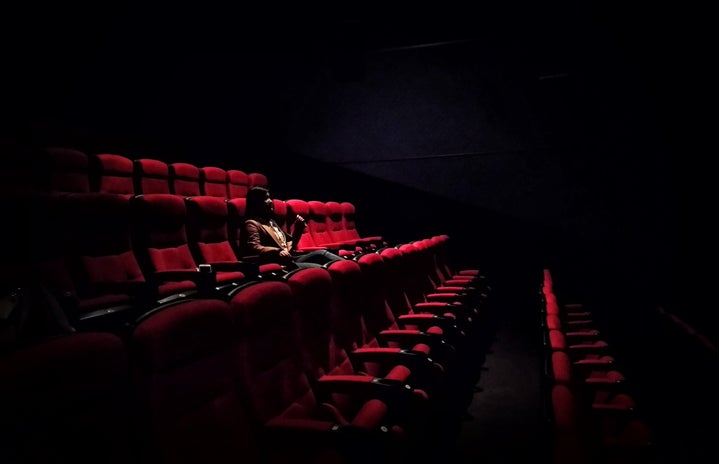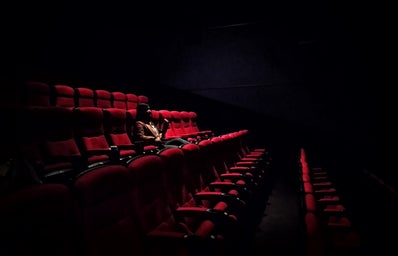Edited By: Tanmaya Ramprasad
Throughout the last ten months, there have been two words on every cinephile’s lips.
Two words. One name. One legend.
Chloe Zhao.
Best known for her raw, authentic portrayal of nomadic life in Nomadland (2020), Zhao went on to win big at the 93rd Academy Awards, taking home the statuettes for both Best Director and Best Picture.
And yet, Nomadland is simply one page in Zhao’s life story. A big moment, yes, a major blip—but neither the incite nor the last page. Today, she’s trending once again for her directorial work on Marvel’s Eternals, a film garnering near-equal levels of scorn and adoration. (I’m firmly of the latter camp).
As a writer/director aspirant myself, I vehemently hold Zhao to be one of my greatest inspirations. So, let’s pull back the curtain on her past, and take a look at her life, work, and ever-expanding legacy…
ACT i: The Origin Story
Zhao grew up enamoured by the small and silver screens. Perhaps, then, it was no surprise that she was drawn to telling stories; from drawing comics in school classes to writing fanfiction for her favourite stories (though what these stories were, she still will not reveal).
It wasn’t until decades later, though, that her dreams came to fruition. Dabbling in indie film—the genre allowing for maximal individual control—she wrote Songs My Brothers Taught Me, a coming-of-age drama/tragedy tale of two Native-American siblings and the ways in which they live their lives.
And yet, she did not just write it.
She also directed it. And co-produced it. And edited it.
No, Chloe Zhao was not simply a writer, nor was she solely a director. She was a jack of many trades, yet somehow still a master of each one.
And her work was glorious.
Not only was this film, her first feature, selected to screen at Sundance—one of the most prestigious film festivals on the planet!—but it also went on to play at Cannes, where it was nominated for the Camera d’Or debut award.
Zhao followed this with The Rider, another film that opened to critical acclaim: another Cannes selection, considered to be one of the best in 2018. (Even Barack Obama included it in his best-of-2018 titles).
Part of the allure, within both of these films, was their emotional backbone. Songs My Brothers Taught Me, a poignant glimpse into the life of a Native American family, possessed the relevancy and real-life struggles of a group so often hidden from Western entertainment. The Rider, on the other hand, was a story of self-discovery, the true, harrowing tale of a man whose rodeo dreams are stripped from him when an accident nearly ends his life. It’s a tale of loss and love, of frustration and legacy: genuine human emotions, woven into a tale born of truth.
And yet, what sets Zhao apart—aside from her uncanny ability to capture the human condition—is her unconventional desire to cast not name-brand actors, but ordinary people to play each of her roles.
The Native American characters in Songs My Brothers Taught Me were played by men and women living on a reserve. The lead role in The Rider was not played by a typical A-lister, but in fact, by the very man, the story was about: a former rodeo rider. The roles of his siblings, too, were played by his real family.
It brings a touch of authenticity, showing the world through the eyes of those who’ve lived it. It’s unique, yes, and alluring. It’s seldom been done before—and wow, is it successful.
And that’s not even taking into account the gorgeous cinematography, or Zhao’s commitment to using natural light, on-site locations, and minimal CGI, no matter how big the project.
That is the Chloe Zhao trademark. No wonder, come 2020, her works caught on like a wildfire—thanks to her next feature, Nomadland.
Act II: Rising to Critical Success
For her third film, Zhao once again returned to the writer/director/editor/producer chair, donning all the necessary hats to craft another masterpiece. The story of a nomad traversing the United States with nothing but a trailer. It captivated both audiences and critics with its sweeping shots, sophisticated score, and emotional realism.
Perhaps it was “Triple-Crown” awardee, Frances McDormand, in the leading role that led to its global notice (and acclaim). Perhaps it was the zeitgeist, Zhao’s eventual notoriety simply bound to happen.
Regardless of the rationale, Nomadland swept across the nation (much like Fern, the lead, swept across the States).
Suddenly, Zhao’s name was everywhere. Following the 2020 Venice premiere (where it won the Golden Lion), it went on to play at the Toronto International Film Festival (where I had the privilege to see it. Spoiler: it’s amazing). There, it continued its early awards sweep, taking home the People’s Choice Award for its audience resonation.
And then… the awards circuit arrived.
Now, yes, it is wholly unreasonable to call 2020 a year anything less than unconventional—especially when it comes to entertainment. And yet, the latter half of the year nearly made up for the COVID-19 draught: from arthouse films to blockbusters, streaming originals to theatrical exclusives, there was more than enough content to fulfil the Oscars void.
Nomadland was still nominated for every major award, both indie and mainstream. 164 total nominations, the film ultimately garnered, and of that, 110 wins: unheard of. Truly, unabashedly historic.
Unquestionably deserving.
It is so rare for a woman’s film to receive widespread recognition; I remember the #OscarsSoMale controversy from just the year prior all too well. And for a woman of colour? Well, that’s exponentially more difficult.
We live in a world that likes to congratulate itself on being so progressive, and yet, despite the appealing statements made by committees and organizations, unconscious biases run rampant.
So to see the Academy recognize Zhao, a Chinese-born female filmmaker, as the best of the year—and one of the greatest of the generation—it marked a major turning point for behind-the-camera recognition. After all, Zhao was only the second woman to win the directorial Academy Award (and the first in a decade, after Kathryn Bigelow’s 2010 win). She was the first woman of colour to even garner a nomination.
That she won was revolutionary—and, of course, wholly merited. After all, when it comes to taking risks, penning emotionally-wrecking stories, and filming thought-provoking stories, edited to perfection, well… there’s not a filmmaker in existence who holds a candle to multi-hyphenate Zhao.
Act III: Revolutionizing the Modern Blockbuster
And so, that brings us to the present day. 2021, a year after the unanimous awards sweep of Nomadland—and the debut of Zhao’s latest film, a step away from the indie lens, into the world of the cinematic blockbuster.
The film for which she first entered my radar, nearly three years ago.
Marvel Studios’ Eternals.
At the time of writing this piece, it is 10:39pm on November 6th. But twenty-six hours ago, I was sitting in a darkened theatre, knees tucked up against a plastic seat, eyes wide as I gazed up at the illuminated screen.
Even before I’d learned of Zhao’s success, before I’d heard (or seen) any of her previous works, Eternals had been my most-anticipated film of the entire Phase 4 slate—and that’s saying something, considering my deep-rooted love for Spider-Man and Doctor Strange.
Somehow, the story seemed to call straight to my soul.
It’s the tale of an immortal family, tasked with protecting humanity since the dawn of time. It spans 7000 years, chronicling the most formative days of human history. And yet, at its core, it is a story of the divide between good and evil, and what it means to be—to feel—human. It’s an exploration of the meaning of life, and the cost of holding power.
It’s nuanced, it’s relevant, and wow, does the casting reflect the real world. Eternals, from its naturally-lit aesthetics to its deep emotional core, is the film I feel I’ve waited my entire life to see.
Simply put, it is a masterpiece. And with Zhao’s name attached to it—not just as a director, but co-writer, too—how could I have been surprised?
Sure, it’s garnering some criticism on the internet. Some argue that it’s slow, with exposition bogging its first two acts. Others dislike its greater Marvel continuity, believing that its quips are overshadowing the drama.
And yet, as any fantasy reader could tell you, worlds are built through exposition. Packing 7000 years into 157 minutes is nowhere close to an easy feat—still, Zhao managed it perfectly.
Somehow, within this single film, Zhao revolutionized the comic-inspired genre. With an artful eye and a steady heart, she stripped these ten immortals down to bare their very souls. They were not simply “super,” defined by glowing gold energy strands and unbelievably long lives: they were super-humans. Beings with hearts, with hopes and dreams; experiencing loss, grappling with destruction.
It’s a film unlike I’ve ever seen.
And twenty-six hours later, I’m still thinking about it.
Epilogue: A Filmmaker Eternal
Somehow, with budgets both big and small, Zhao has mastered the art of weaving stories around the human condition. And is that not, deep down, what we all crave to see? An exploration of our lives, the song deep within our souls?
Whether grief and finding oneself in Songs My Brothers Taught Me, loss and hope in The Rider, loneliness and beauty in Nomadland, or morality and heart in Eternals, every Zhao movie is inked with her personal stamp. No one understands the human condition quite like Chloe Zhao, and perhaps no one ever will; it is a testament to her eye, her talent, that her films can speak to all—age, sex, race notwithstanding.
Her films are for the ages: written for the times, and yet, still somehow timeless. And that’s just in her storytelling: her trademark wide shots and naturally-lit settings elevate her works to an almost-ethereal level.
She’s set to continue paving her path with a western biopic, the story of Bass Reeves; she’ll also write and direct a “futuristic sci-fi Western” take of Dracula, creating perhaps the most innovative interpretation yet of the infamous blood-sucker.
With these films (as well as those that’ll come next), Zhao will continue to cement her legacy: not just as a writer-director, but as one of the most artistic and brilliant minds of cinematic history.
I, for one, can only dream of following in the footsteps of her legacy.


